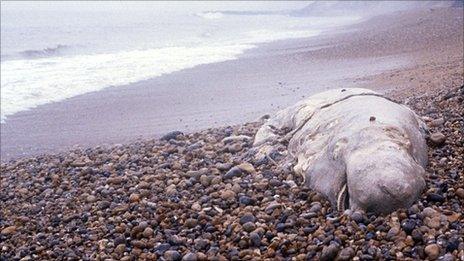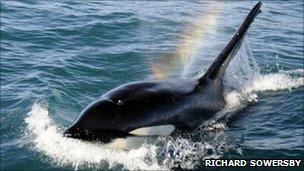Whale and dolphin turbine injury risk to be studied
- Published

The research would probe the factors influencing the movement of carcasses
The risks to whales and dolphins from tidal turbines are a "potential show-stopper" for marine energy plans, according to researchers.
The warning comes as a study will examine possible sites where animals injured by turbines could end up stranding.
The new University of the Highlands and Islands is offering a postgraduate studentship in the research.
UHI said how the animals would behave around turbines was unknown.
The development of marine renewables in Scotland is still in the early stages with prototype devices being built and tested.
A report published in 2010 on the potential benefits of harnessing wave and tidal power suggested £2.5bn could be spent in Scotland and 5,300 jobs created by 2020.
Industry forum Scottish Renewables and development agency Scottish Enterprise had commissioned the study.

Scottish waters provide habitat to large marine mammals including killer whales
Scotland's waters provide habitat for dolphins and killer whales as well as large fish such as basking sharks.
The dangers of marine mammals being injured by tidal devices have already been recognised following reports published in 2008 and 2009.
A study of harbour porpoises suggested one turbine could come into contact with up to 13 animals in one year, according UHI's information on the studentship.
However, the university added that the number of collisions in reality was expected to be much lower.
The new research will investigate where injured animals and the bodies of dead ones could potentially end up.
It will look at how carcasses are carried on tidal current and moved by wind and waves onto beaches.
Oban's Scottish Association for Marine Science, which is part of UHI's network of colleges and research centres, will host the study.
Methane gas
UHI said: "For the species at risk, collisions could have welfare and population consequences, for regulatory agencies they may have conservation implications and for developers and utilities they run the risk of damaging the devices, imposing uneconomic consenting requirements and alienating public opinion.
"Consequently establishing a good understanding of the magnitude of this potential show-stopper is important to the efficient growth of this Scottish-led energy sector."
The postgraduate studentship is one of 12, external UHI has offered in the research of energy, environment and health.
Others looking at energy include studies of how wave power farms might affect the natural movements of the sea and sediment and also methane gas released by seaweed and fish waste.
- Published13 May 2011
- Published23 March 2011
- Published1 April 2011
- Published25 August 2010